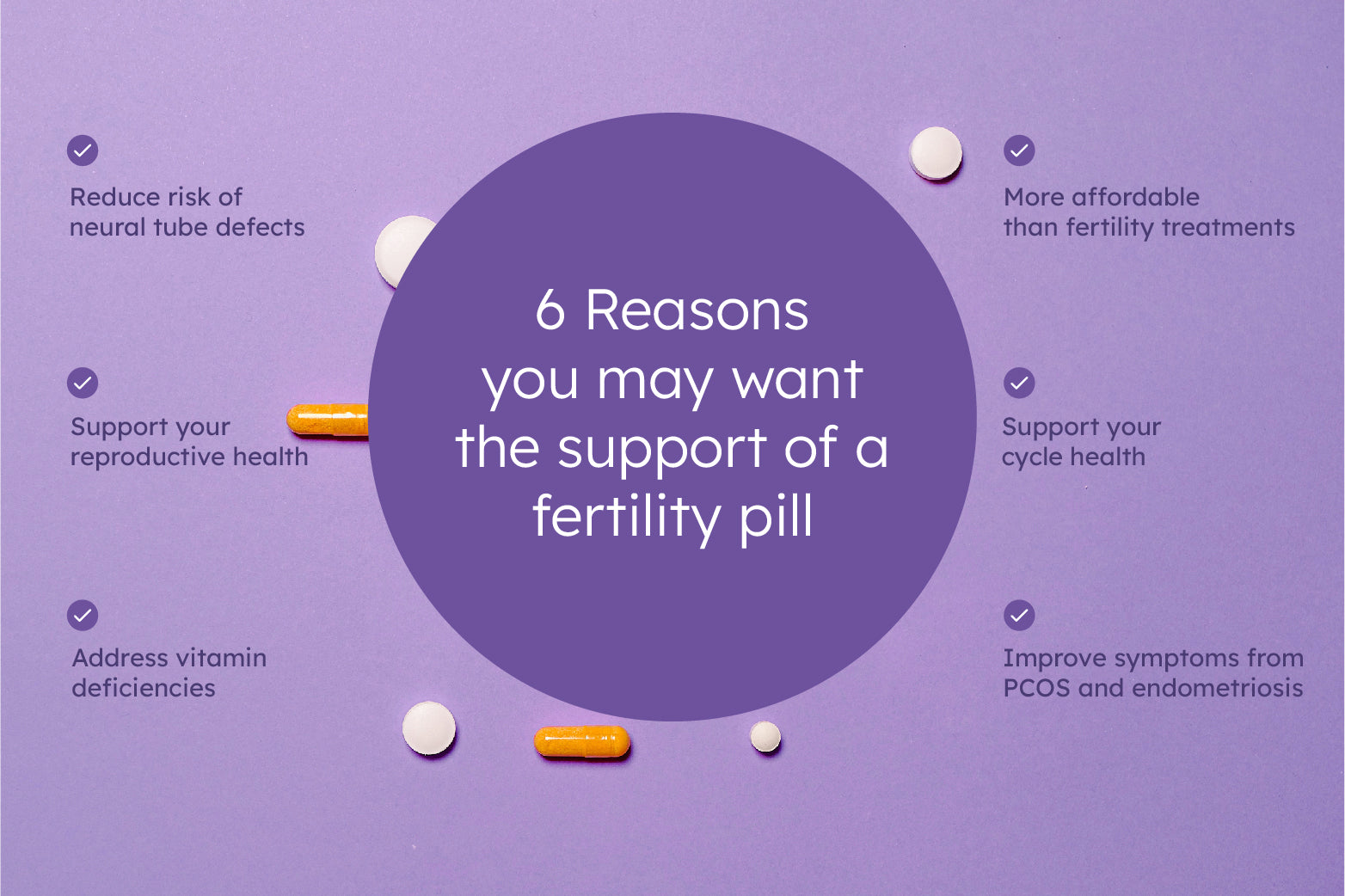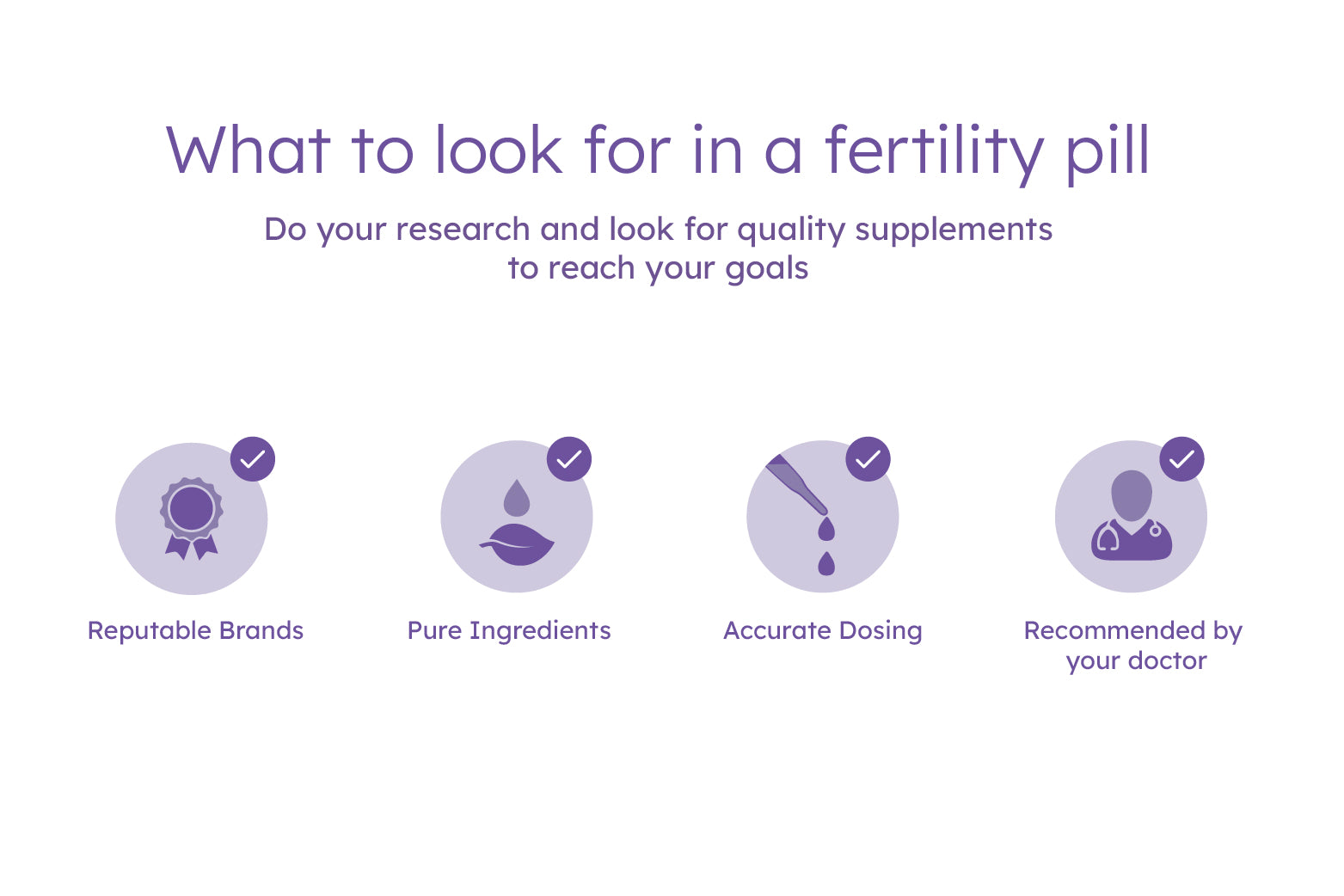What are fertility pills?

There are a lot of fertility pills available to help you reach your fertility goals, but where do you start in figuring out which ones are best for you? The best way to start your search for the right fertility pill is to figure out what you hope it will do for you.
Are you hoping to get pregnant? Need help with cycle irregularity? Most commonly, these pills can be found over the counter, but there are also prescription fertility drugs available from a medical doctor. Furthermore, fertility testing can help give insight into your fertility journey. Let’s dive into what to look for in a fertility pill!
How to Choose a Fertility Pill
You’ve decided you’re ready for some help with your fertility goals from an oral supplement. Great! Now let’s look at what your fertility goals are and how a fertility pill may help you on your journey:

Health & Wellness
Are you looking for support for specific issues like PMS or irregular cycles? Do you have an overall goal of supporting your reproductive health?
The good news is there are many vitamins and supplements that are good for doing both. Even if you don’t have a specific diagnosis you’d like to address, there are supplements that can help your cycles function better.
For general health & wellness, you likely won’t need prescription fertility medications, although we always recommend consulting your doctor with any health concerns.
Trying to Conceive
Thinking about growing your family? You can begin preparing for this big event even before pregnancy! In fact, research suggests it’s a good idea to start preconception planning at least 3 months before you hope to conceive.
Studies show supporting your reproductive health through targeted supplements before conception can help vitamin deficiencies return to healthy levels and can help reduce oxidative stress (if using antioxidant supplements, as well).
Optimizing ovulation in this way can make all the difference when you’re ready to say, “Let’s do this!”
Struggling to Conceive
Did you know that the most common cause of female infertility is ovulatory dysfunction? This means that supporting your ovulatory function is critical to your reproductive health and the possibility of pregnancy. Certain vitamins and herbal supplements may help you optimize your health and improve hormonal balance, ovulation, egg quality, and even the likelihood of pregnancy.
If you’re under the age of 35 and have been trying to conceive for over a year, or over the age of 35 and have been trying to conceive for at least 6 months, your doctor may also recommend prescription fertility drugs in addition to supplements. Not everyone needs fertility drugs, but if your doctor suggests them, they may be worth researching!
Fertility Pills for Support
Prenatal Vitamins
You may be wondering if it’s the right time to take prenatal vitamins. If you’re currently trying to get pregnant, or think you may want to in the next 3-6 months, then yes! Now is the time to get started taking a prenatal vitamin that includes folate or folic acid. This specific vitamin reduces the risk of neural tube defects in an embryo during those critical first few weeks of pregnancy.
If you’re not planning on getting pregnant anytime soon, it may still be a good decision! Prenatal vitamins are full of the support needed during reproductive years.
Vitamins
Whether you’re trying to get pregnant or trying to optimize your reproductive health, addressing vitamin deficiencies may be the first step to increased reproductive health. Supplements like Vitamin D, myo-inositol, N-acetyl cysteine, CoQ10, zinc and iron can make a big impact on your reproductive and cycle health. Each of these supplements are available over the counter from your local drug store or online retailer.
Herbal Supplements
Herbal supplements may make a big difference in overall reproductive health, especially when trying to conceive. Some studies show effective improvement for conditions like PCOS, premature ovarian failure, endometriosis, hyperprolactinemia, and hypothalamic dysfunction. And since it’s often more affordable and available than modern fertility treatments, the use of herbal supplements is increasing in the “trying to conceive” community.
Proov offers a variety of herbal supplements to support progesterone production, support estrogen production, and support estrogen metabolism!
We always recommend consulting your doctor before adding anything new to your regimen.
What should you look for in a fertility pill?

Now that you know what you need your fertility pill to do, it’s important to research which one is right for you! Not all fertility pills are made the same. Be sure to research the brand or company you’re considering, to make sure their ingredients are pure and their dosages are accurate. There are many online resources available that direct you to the best brand in each category.
Another safe place to start would be with your local doctor, who can give you brands they know of and trust. While getting their input, they can also review your list of supplements and any medications you’re taking to be sure there are no contraindications.
Prescription Fertility Drugs
If you’ve been struggling to conceive, your OBGYN or RE (reproductive endocrinologist) may recommend prescription fertility drugs. These drugs assist in inducing ovulation, in case the body is struggling to do so. Drugs often used for this purpose are Clomid and Letrozole.
Clomid
Clomid (clomiphene citrate) is often suggested when the patient’s symptoms include infertility and trouble ovulating. It’s an oral medication that blocks estrogen production so that the body thinks there is a need for more. The hypothalamus and pituitary glands then respond and create more, which helps to mature egg follicles and, hopefully, ovulation. Because of its effect on maturing egg follicles, it’s critical that you follow your doctor’s advice in order to avoid a large number of multiples (quadruplets, etc).
Femara
Femara (letrozole) functions similarly to Clomid (an oral medication that blocks estrogen) but does so in a slightly different method, by blocking the enzyme aromatase. Some who experience side effects with Clomid and Femara to be a welcomed alternative. With proper medical management, the possibility of multiples (including 4+) are reduced with Femara, as well.
Both of these drugs may be used when experiencing infertility, and PCOS or an ovulation. In order to receive a prescription for these fertility drugs, you’ll need to speak with your OBGYN who can discuss the risks and benefits involved.
Over the counter vitamins may be exactly what you need to help optimize your fertility! With vitamins, herbal supplements, prenatal vitamins, and fertility drugs, there are fertility pills available to help with a variety of reproductive health concerns.
If you’re looking for other cycle support products, you can find them on our website!











